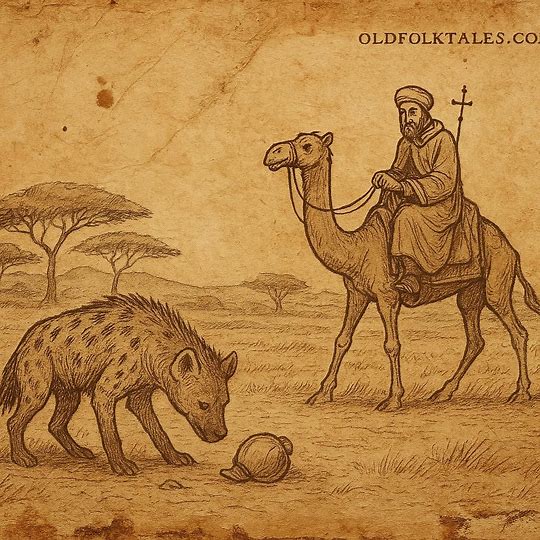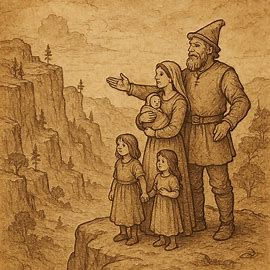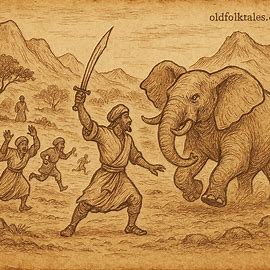Long ago, in the sun-scorched lands of Northern Abyssinia, a Moslem prophet met a hyaena and spoke to her with solemn authority: “Pronounce the creed and vow to eat only what thou hast killed thyself!” The hyaena, known among the Tigre people as “Daughter of Moses,” bowed her head and made the sacred vow, promising to abstain from carrion forever. The prophet then mounted his camel, allowing the hyaena to ride behind him as they journeyed across the golden plains and rugged hills.
As they travelled, villagers and passersby stopped in astonishment. To see a hyaena, that cowardly and cunning creature, obediently riding with the prophet was a sight that filled their hearts with wonder. Some whispered of her vow, marveling that even a hyaena could aspire to righteousness.
Their journey continued until the road led them past a carcass, still fresh, lying under the relentless sun. The hyaena’s keen nose twitched, and she sniffed eagerly at the scent. “Daughter of Moses,” the prophet admonished gently, “do not sniff at this now, for thou hast sworn a vow!”
The hyaena paused and looked up at him with pleading eyes. “May we not even sniff at it?” she asked. The prophet’s voice was firm: “No, thou must refrain.” She lowered her head, seeming to obey.
But soon the irresistible scent of the carrion overcame her resolve. With a decisive leap, she jumped from the camel and pounced upon the carcass, exclaiming, “This is the food of my mother and my father!” The prophet, sorrow filling his heart, shook his head, for he knew the hyaena had broken her sacred vow. Resigned, he mounted his camel again and continued on his journey, leaving the hyaena behind.
READ THIS: The Tale of the Three Couples: A Tigrean Folktale That Teaches Lessons on Trust and Ingenuity
From that day forth, among the Tigre people, a proverb arose: “Thy vow has become like that of the hyaena.” It serves as a cautionary tale to those who make promises or oaths but fail to honor them, reminding everyone that integrity is measured not by words, but by action.
The hyaena, known as Daughter of Moses, is seen in Tigre culture as a hermaphroditic and cowardly animal. Particularly, the species Hyaena striata often hides during the day, while Hyaena crocuta can be more aggressive, preying on lone travelers or children. This tale, rooted in the northern Abyssinian tradition, preserves the lesson that even cunning or timid beings face consequences when their word is broken.
Moral Lesson
The story teaches the importance of keeping promises and upholding integrity. Breaking a vow, no matter how small or seemingly insignificant, diminishes trust and carries consequences, both socially and spiritually. True character is revealed in the ability to honor one’s word, even in the face of temptation.
Knowledge Check
Who gave the hyaena her vow in the story?
A Moslem prophet.
What was the hyaena’s promise?
To eat only what she had killed herself, abstaining from carrion.
Why did the villagers find the hyaena riding with the prophet astonishing?
Because hyaenas are cowardly and typically wild; her obedience and vow were extraordinary.
What does the proverb “Thy vow has become like that of the hyaena” mean?I
It warns against breaking promises or failing to honor commitments.
Which species of hyaena is known to be more cowardly and hides during the day?
Hyaena striata.
Where is this folktale culturally rooted?
Northern Abyssinia, among the Tigre-speaking people of Eritrea.
Source: Tigrean folktale, Eritrea






